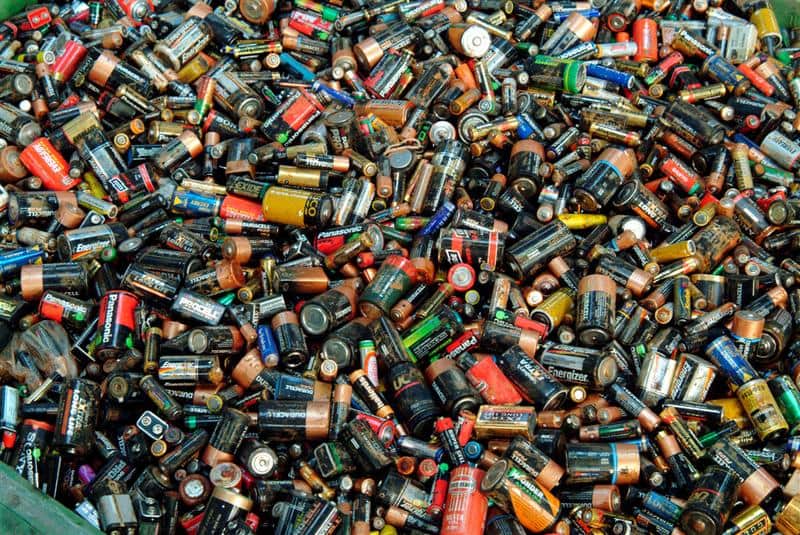OPINION: Perhaps the first question we should ask is, “should we care how a battery is classified and does it really matter”? The simple answer is an emphatic “yes”, and its classification is having a direct impact upon the environment.
Failure to be clear and consistent with battery classification has led to a situation where certain types of lead acid batteries are classed as non-portable when placed on the market – meaning they do not fall within the ‘producer pays’ principle. These same batteries are then being recycled (due to their intrinsic material value), miraculously changing status, and thus generating recycling evidence for other battery producers (producers of often more difficult, costly and hazardous batteries to recycle safely, such as lithium batteries).

This imbalance is not only environmentally damaging, it is directly impacting the UK’s underlying battery collection rates. It is stifling the investment the UK needs to develop its collection and recycling infrastructure to meet future targets. The direct result of this market distortion is that the current portable battery sector is worth circa £18 million rather than £40 million if this anomaly was resolved. At the same time, registered portable battery producers and their consumers are bearing the cost.
Since the introduction of the Waste Battery Regulations, back in 2010, the Environment Agency and Defra have been made aware of this issue, with a survey of battery recycling conducted in 2017, pointing out that this aberration is unique to the UK. In fact, the Agency’s own summary of portable battery data published in June this year made clear that 8.4 times the weight of lead portable batteries reported as placed on the market were collected and claimed as evidence.
Why does this little-known anomaly have such an impact?
The fact that lead batteries are recycled for their lead value, while most portable batteries have a cost to recycle, is driving this distortion. In 2020, lead evidence represented 65% of the UK’s portable battery obligation, yet only 3% of these batteries were reported as being placed on the UK market. It is predicted that this ratio is going to worsen to over 75% of obligation in this year.

We know that 1,367 tonnes of portable lead batteries were reported as placed on the market by UK producers in 2020. This has cost these correctly registered producers nearly £2m in obligation and membership costs, even though the high value of the recoverable lead means they’d have been recycled without the need for financial incentives. The Agency, however, reported at least 10,856 tonnes of portable waste lead batteries had battery recycling evidence claimed on them. This saved their producers approximately £16 million a year in obligation costs and, worse than that, passed on that cost to lawfully registered producers. In reality, the amount of portable lead batteries placed on the market in 2020, which should have attracted an obligation under current regulation, was probably closer to 17,000 tonnes.
The financial impact goes way beyond the lead battery producers. Much of the evidence costs paid by registered portable battery producers is currently going to lead smelters and ABTOs for batteries that were going to be recycled anyway. This has held back investment in household battery recycling whilst also incurring additional costs to the recycling sector for storage and transport.
Who’s benefiting?
The reliance on lead evidence means that long established lead smelters are now demanding even more for their evidence and market rates as high as £1,700/tonne have been quoted. The simple reason for this is that it’s still easier to buy lead evidence than it is establish new collection networks to collect and recycle mixed portable household batteries, especially with the continual increase in expensive to treat lithium batteries.
How does it impact recycling rates?
This anomaly has held the UK back from achieving the recycling targets and the overriding objectives that were intended. In 2010, the UK was already 10 years behind many countries in setting battery recycling targets and even by exploiting this loophole, the UK is still woefully behind countries such as Belgium, France and Switzerland. There is a clear environmental impact resulting from the loss of sustainable and easily recoverable materials being landfilled or incinerated in energy to waste facilities.
This anomaly has held the UK back from achieving the recycling targets and the overriding objectives that were intended
Producers may differ in their own interpretation of the regulations. If we look at other countries in Europe, most do not have this issue. Whilst the UK has 740% more lead batteries being claimed as recycled than reported as POM, the next worse is France with 37%. The French government has, however, stepped in to stop WEEE recyclers claiming evidence. Ten years on the UK government has yet to address the problem.
Is they is or is they ain’t portable?
There are complex technical arguments as to whether small lead portable batteries(<4kg) should be regarded as portable or not. Frankly, this is not the issue. The problem is that the regulators allow certain batteries to change status from not being subject to the regulations, to being used as currency to meet the regulations. While this continues, the current market distortions are bound to continue.
The whole purpose of the Waste Battery Regulations is to encourage, if not force, us to recycle portable batteries. Automotive batteries were excluded due to the fact they were collected and recycled through existing channels. Surely the same logic based on material value applies to all lead-based batteries?
If we continue as we are, the UK will struggle to recycle and report 11.5% of the portable batteries placed on the market this year, a long way from the 45% target as set out in the 2010 regulations and even further away from the 65% target Defra are suggesting we are to adopt by 2025.
New guidance
New government guidance published in September 2021 has unfortunately failed to clarify the issue (see letsrecycle.com story). The technical view was taken that small lead batteries are sealed and not vented, as with larger lead batteries, and for this reason they consider them portable. At the same time, the UK policy makers and regulators know that hundreds of producers are placing these batteries on the market but as yet, are not registering as a producer in order to meet their legal obligations. Many of these producers are based overseas, while many of these batteries are arriving installed within electrical equipment. There is little sign to show that producers are queuing to sign up to their polluter pays responsibilities and therefore the environment is the clear loser.
If our leaders and policy makers cannot fix a simple issue like this then how will we ever meet our commitments on climate change?
Defra expect that mechanisms such as modulated fees might solve the problem but, at best, that is another three years away. In the meantime, the UK will slip further behind in recycling portable batteries, leaving what will clearly become an insurmountable problem. If our leaders and policy makers cannot fix a simple issue like this then how will we ever meet our commitments on climate change and the UK’s nationally determined contributions published in December 2020?
The solution
We must act fast to either remove portable lead batteries from the regulations or remove the excess evidence resulting from their recycling. What the UK can no longer allow is the status quo to continue or, to coin a phrase from COP26, it will be all blah blah blah. Defra and the Agency must now meet their government’s wider ambitions and ensure that the cost for recycling batteries is equitably shared by all producers. Increasing both consumer knowledge and the incentive to recycle portable household batteries will ensure the UK starts to fulfil both the intention and spirit of the Waste Battery Regulations.











Subscribe for free